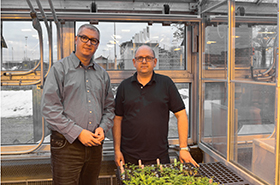Set up an interview
Media Relations
Agriculture and Agri-Food Canada
1-866-345-7972
aafc.mediarelations-relationsmedias.aac@agr.gc.ca
Weeds growing in vegetable crops cause tens of millions of dollars in losses every year in Canada. Since the 1980s, a significant increase in herbicide resistance has been observed around the world. Herbicide resistance is the inherited ability of a weed plant to survive and reproduce after herbicide treatment. The scale of the problem is closely linked to the repeated use of the same herbicide or a group of related herbicides.
In 2015, 65 cases of resistance were identified in Canada, including 3 in Quebec. Owing to increased awareness and vigilance on the part of agricultural producers, the number of cases increased to 117 Canada-wide and to 13 in Quebec in 2018. Prevention is the key to managing resistance and minimizing damage.
Agricultural advisors can provide valuable guidance for deciding what measures to take to reduce the potential for the development of herbicide-resistant weeds. Producers can implement various strategies such as destroying weeds before they set seed, rotating herbicides between herbicide groups, and using cover crops and green manures. By watching for signs of herbicide resistance, they can act quickly to halt the spread of resistant plants. If resistant weeds become established in fields, crop yields will be affected significantly.
Good news for vegetable producers: A new leading-edge genetic method developed by Agriculture and Agri-Food Canada (AAFC) is now available to help producers quickly detect resistance.
Genetic detection
When preventive approaches fall short, a zero-tolerance policy should be adopted. Every resistant weed plant that is not destroyed will add seeds to the soil seed bank, thereby compounding the problem of resistance. After three or four years, the entire field will be populated with herbicide-resistant weeds and yields will be severely reduced. How can producers detect plants with resistance genes more rapidly?
Martin Laforest, a weed science researcher with the Saint-Jean-sur-Richelieu Research and Development Centre (RDC), has carried out extensive research on the phenomenon of herbicide resistance. By discovering genetic mutations linked to resistance, Laforest was able to develop a set of molecular tests that can be used to identify herbicide-resistant plants much faster than with conventional methods.
"With just a few fresh leaves from a weed plant, a technician can determine whether resistance genes are present in less than two weeks. Producers will benefit from this new detection method. It will help to slow the development of herbicide resistance and support the implementation of strategies for managing this problem quickly and limiting its economic impact."
- Martin Laforest, weed science researcher, Agriculture and Agri-Food Canada
Agricultural producers in Quebec can take advantage of free herbicide-resistance testing services now offered by the plant health expertise and diagnostic laboratory (Laboratoire d’expertise et de diagnostic en phytoprotection) of the Quebec Department of Agriculture, Fisheries and Food. For more information on this service: Tests moléculaires de détection de la résistance des mauvaises herbes aux herbicides (in French only).
The same genetic markers have also been used to detect weed plant resistance in Ontario.
"The markers we developed have already been used to characterize weeds in a number of fields in Ontario. Rob Nurse, a research scientist at the Harrow RDC, sent me samples of several plants suspected to be herbicide resistant. Genetic tests confirmed that some of them were in fact resistant. MAPAQFootnote 1 and OMAFRAFootnote 2 are currently holding discussions on a collaborative approach for making these genetic markers available for the rapid detection of cases of herbicide resistance in Ontario."
- Martin Laforest, weed science researcher, Agriculture and Agri-Food Canada
Wide adoption of this genetic technology would help to greatly limit the negative economic impact of the spread of herbicide-resistant weeds. It is important for all stakeholders in the horticulture sector to join in the efforts to prevent and combat herbicide resistance. Early detection using the molecular markers developed by AAFC is an approach that will be shared with the other Canadian provinces in the medium term. Find out more from your agricultural advisor.
Key discoveries (benefits)
- The discovery of genetic mutations associated with herbicide resistance made it possible to develop molecular tests that are much more rapid than conventional methods for detecting plants that have developed resistance to herbicides.
- These tests will help to slow the development of resistance, ensure that management strategies are implemented faster and limit the economic impact of herbicide resistance.
- Free herbicide-resistance testing services are now offered by Quebec Department of Agriculture, Fisheries and Food (MAPAQ)’s plant health expertise and diagnostic laboratory (Laboratoire d’expertise et de diagnostic en phytoprotection): Tests moléculaires de détection de la résistance des mauvaises herbes aux herbicides (in French only).
- Discussions are under way between MAPAQ and Ontario Ministry of Agriculture, Food and Rural Affairs (OMAFRA) on a collaborative approach for making these genetic markers available for the rapid detection of cases of herbicide resistance in Ontario.
Contribution to the research by the Pest Management Centre.
Photo gallery

